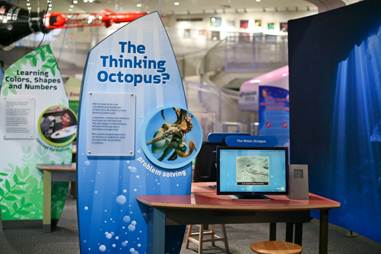
News release from Science Central:
Science Central welcomes “Wild minds…What animals really think;”
New traveling exhibition focuses on animal intelligence
(April 8, 2013) – Fort Wayne’s top two tourist attractions have collaborated with other science centers and zoos from around the country to develop Science Central’s next traveling exhibition, “Wild Minds: What Animals Really Think.” Tentatively scheduled to open on Friday, April 19, and run through September 8, the exhibit will show Science Central visitors just how bright our friends in the animal kingdom, like those at the Fort Wayne Children’s Zoo, can be.
The exhibit, developed through a grant from the National Science Foundation, was a collaborative effort between Science Central and the Fort Wayne Children’s Zoo, along with four other zoo and science center partnerships from around the country. These include the New York Hall of Science and the Staten Island Zoo; Oregon Museum of Science and Industry and the Oregon Zoo; California Science Center and the Santa Barbara Zoo; COSI (Center of Science and Industry) and the Columbus Zoo and Aquarium.
“We’ve timed our exhibition of ‘Wild Minds’ to coincide with zoo season,” said Science Central Executive Director Martin Fisher. “We hope people will closely observe animal behavior when they visit the zoo, then come to Science Central to visit ‘Wild Minds.’ This combined experience will provide an excellent overview of how and why animals behave the way they do.”
Many species demonstrate cognitive skills long thought to make human beings unique: using tools, solving problems, self-awareness, and the ability to communicate. Over decades, researchers have documented these talents in different animal species, observing behavior in the wild and in carefully controlled laboratory experiments. Using a variety of videos, games and displays, Wild Minds shows visitors how animals’ environments have shaped their thinking abilities and explores evolutionary links between humans and animals.
“The Wild Minds project gave us the opportunity to learn how museums develop exhibits, and for museums to see how zoos view that same process,” said Jim Anderson, director of the Fort Wayne Children’s Zoo. “We’re pleased that Fort Wayne is among the first communities to host the Wild Minds exhibit.”
The Wild Minds exhibit components and activities on view at Science Central will include:
Is This Thinking? – Using a large, touch screen monitor, weigh in on whether the animal behaviors you observe (via video clips) are hard-wired or require “thinking.” After recording your opinions, you can hear what scientists think the behavior demonstrates.
Wild Minds at the Zoo – A video display that tells the story of zoo enrichment programs showing how zoo animals are provided with ways to exercise their brains.
Brain Power – A display of five plastinated brains from a parrot, dog, chimpanzee, dolphin and a human allows a comparison of human and animal brains by size and complexity.
Get-the-Peanut Experiment -Think about how you would get the peanut out of the tube. Then, view a video of children and apes taking this challenge.
Birds with Big Brains – Consider how you would get a piece of meat (lodged in a small basket) out of a tube, using only a straight piece of wire. This is the same experiment originally solved by Betty the Crow.
Remembering Numbers at a Glance -Take the same numbers and spatial memory test posed to a chimpanzee and see how you compare.
Learning Colors, Shapes and Numbers – Learn about Alex, the famous African gray parrot known for his skill at cognitive challenges.
Is That Me I See? – Watch a video showing dolphins examining themselves in front of a mirror. Do they recognize themselves?
The Thinking Octopus – After watching a video of a mimic octopus (a species of octopus with a strong ability to mimic other creatures), try to guess the type of poisonous animal being mimicked.
Mimicking Sounds for the Environment – After watching a short clip about the lyrebird, try to determine the sounds being mimicked by the bird.
What Dogs Want – Listen to a variety of barks and try to figure out what the dog is communicating.
Science Central, a not-for-profit 501(c)3 organization, has provided a hands-on fun learning environment for over 17 years. Through our 120+ exhibits, school tours, distance learning programs and weekend public events, we bring the excitement of science and technology to over 130,000 children and adults annually. For more information, contact Science Central at 260-424-2400 or visit us on the web at www.sciencecentral.org.
















